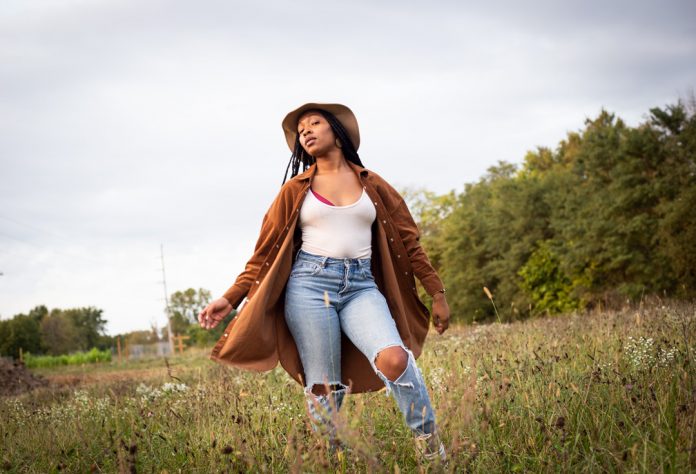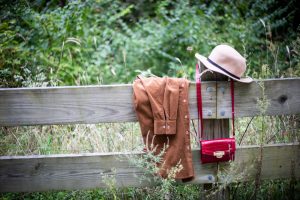
Byron: We’re with Trish. Looking fresh. Trish, tell me about what you’re wearing today.
Trish: So, I’m wearing some mom jeans. I like to wear mom jeans--I think it’s something about the way it fits my body. I’m wearing some Nike SFS boots. I think this top is from Zara. I got this [jacket/dress] from a thrift store. You can wear it as a dress, you can put a belt around it--whatever. I usually wear it as a coverup. My hat is from Zara. This bag I got thrifting as well. For five dollars. I’m usually a big thrifter.

Byron: So, you’re from New York. How did that kind of play into your style with thrifting?
Trish: When I started to make my own money is when I started to create my own style, ‘cause I was able to buy the things that I really wanted to wear. But I think the vibe of Brooklyn is real grimy, but classy. Grimy, but bougie. Hood bougie.
I love kicks. I love wearing sneakers. But in the same token, I like to dress up. So, I kind of do a little bit of both. I’m wearing kicks, but this hat will usually be worn with a more formal outfit. The same with the bag and the jacket.

Byron: How would you describe your style?
Trish: Brooklyn. I’m thinking of different words like trendy or sheik or grimy or ripped. I don’t have any jeans that aren’t ripped. So, a ripped kind of edgy.
I want to use all of those words, but I feel like all of those words describe Brooklyn. So if I could describe the things that I wear or the style that I wear, I think it very much reflects where I’m from.
Byron: Tell me about your earrings.
Trish: I bought these earrings from South Africa the first time I went freshman year. I got these from a black woman--she was selling them at a local market. She actually makes these. I paid double for them. Why? ‘Cause this was a black woman doing something,making her own coin to literally survive. She had her own business and I was really interested in that cause I feel like these earrings tell a story.

Byron: Is that how you think when you’re picking out your outfits? Telling a story about yourself?
Trish: I’ve never really thought of it as telling a story. But it’s interesting because I always go by this motto: look better, feel better. When I’m feeling down in the morning or the night before and I want to have a good day, I’m intentional about the outfit that I put on. So, if I want to feel good, I’ll get up and put some nice things together versus just throwing something on. But even in throwing something on, I think that is also telling a story, you know, I’m just not feeling it today or this is how I’m feeling. So to answer your question, I guess it does tell a story through how I feel that day and what I want to do for myself. My outfits are for myself.
Byron: With how you choose your outfits and the whole narrative about yourself, do you think the narrative you imagine when you put your outfits together is different from how other people perceive you based on your outfits?
Trish: Oh yeah, definitely. I think that’s with everything,with every type of art that you do. And it’s funny because as we were walking, you mentioned [I] am my own artist in some way. And it’s true because sometimes as an artist, what you put on your canvas and your meaning of it may not be the same interpretation that someone else, your reader or your audience, gets. And that’s another thing--I don’t match. So anytime I wear something, I never have the same exact color of something on. So, the way that I match is through different types of shades and I think sometimes people may be like, ‘Hmm she’s not matching,’ but it works. So yeah, I definitely think that my story is misconstrued. But that also goes with who I am as a black woman--always being misconstrued. Black women are always read before they’re even able to speak themselves. So, that’s exactly the same thing with my style.
Byron: How do you deal with that? How do you navigate that struggle of people perceive you differently?
Trish: I think it’s a part of what makes a black woman, a black woman: the fact that she’s able to acknowledge a society where she’s always being interpreted and yet still be a creator. I think that speaks to our resilience. It takes some type of resilience or double consciousness to be able to know that you’ll be interpreted differently and yet still come out with something that ends up being the next trend. But to directly answer your question,how do I deal with it? Sometimes I look at other black women and see how they rock and not necessarily mimic them, but get the energy that I need from them to continue to do what I do.
Byron: There’s the narrative of the angry black woman. When you’re dressing yourself, do you feel like your outfits might reflect that stereotype or do you consciously try and wear something that doesn’t facilitate that stereotype?

Trish: With everything, you’re conscious of that. Not just being black, but being a black woman. I was explaining about my jeans and how I like to wear mom jeans. Black women, historically, have a shape. And of course, you’re conscious of that all the time. Sometimes it does get to me;trying not to be too much, ‘too seen.’ But like I mentioned earlier, I rely a lot on other black women to provide that support cause only they understand my experience. We’re able to appreciate it in a different way. So, do I think about stereotypes? Some days. But then, other days, I’m like f*ck it. ‘Cause at the end of the day, I am who I am and I love that.


